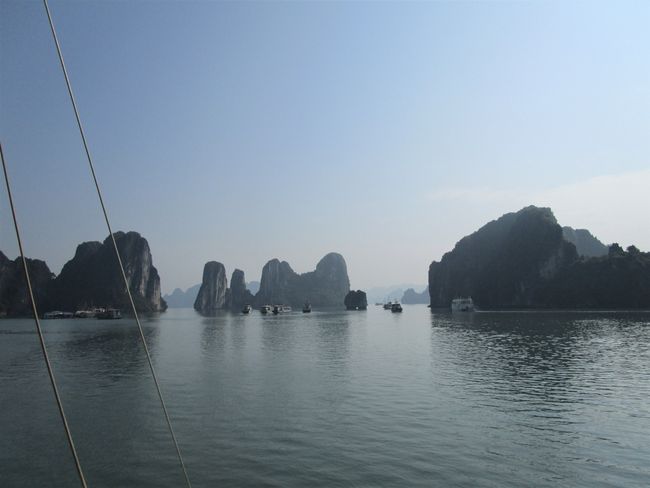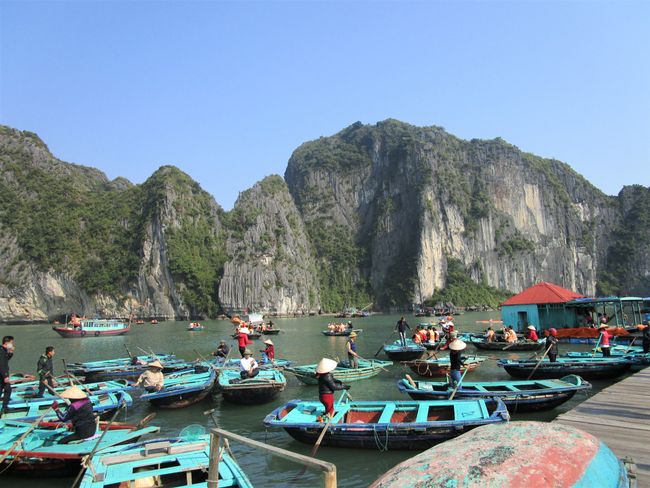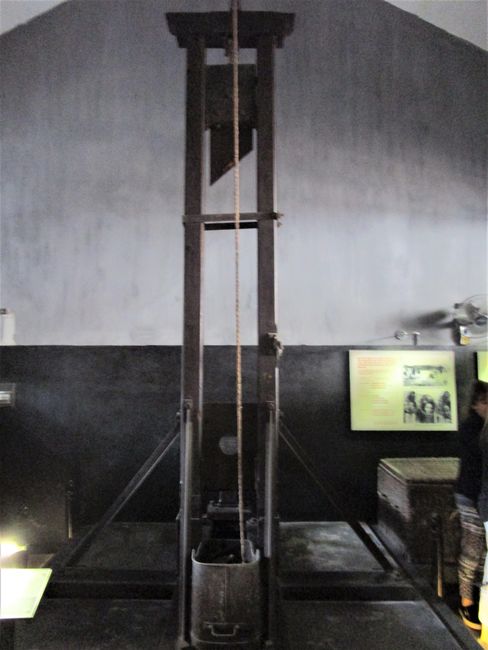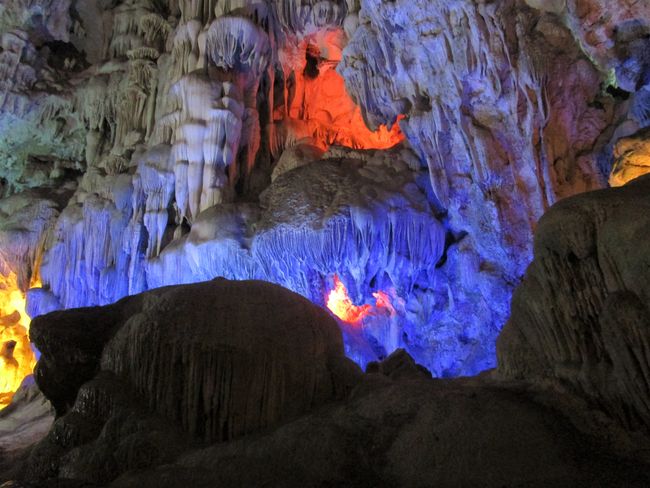Diary of a journey to myself / The Fourth Insight
פֿאַרעפֿנטלעכט: 15.05.2020
29.12., 6:00 PM, Room 303
Where should I start? Two days here in Hanoi and my head is so full of impressions that I can hardly sort them out. Yesterday, 28.12., Halong Bay. Three and a half hours there and four back in a minibus with seats that were inclined too much and were very uncomfortable, causing me to slide forward all the time. With us were about 20 other tourists from Spain, Italy, USA, and Australia, as well as a German couple that we had seen in the entrance or dining area of our guesthouse in the morning and had been avoiding eye contact since then. Both of them around 20-something, black horn-rimmed glasses, black outdoor pants with multiple zippers, black hooded sweatshirts, and black trekking boots. She was grinning and staring at the floor (very strange), he was walking with a bouncing step as if he had bouncy balls under his shoes. The term outdoor existentialists came to mind, while at the same time I had to think of the article in Neon magazine about "The Germans" that I had read last year in Honduras. "The Germans" do everything to not be recognized as Germans during their vacation and would rather avoid fellow countrymen than join them with a big hello. Too bad actually. In terms of outfit, we would have matched perfectly, except that instead of horn-rimmed or sunglasses and instead of trekking boots, we wear black sneakers or boots.
After we arrived at the harbor where countless tourist boats were waiting for their passengers, and we boarded the boat reserved for us, it happened as it was supposed to, and we naturally sat together with the couple and a very friendly-looking American couple at a table for six below deck. It was already noon, sunny but quite cool, and there was a pretty strong wind blowing. Lunch was about to be served. After the pre-noodle soup and a mixed salad, the fish in all its glory (that is, complete with its head, like the guinea pig in Cusco) was served. This prompted the German to directly and quite arrogantly address Luc, who was sitting opposite him: "This is clearly the responsibility of the oldest person at the table." Fortunately, he did not hear Fabian's retort, "Or the oldest woman," which made me want to bite him on the arm, which he needed, however, to dissect the fish, while the German continued to grin arrogantly and avoided eye contact again.
After we had gone a bit away from the harbor, we were allowed on deck, and the view of the cliffs was really the same as in the intro of "Indochine." The only thing missing were the dragon boats, but there were plenty of other tourist boats, which did little to affect the overall impression. Surely, at dawn or in fog, and beautifully picturesque with one or two dragon boats in the background, the view would have been perfect and as mystical as I had imagined, but then we would have had to be here 50 years ago, just like in the impressive Dragon Cave, where the dragon, according to legend, used to live and which, according to legend, spit diamonds into the sea, from which the rocks in Halong Bay are said to have originated.
However, the dragon could not prevent the cruel war that the Vietnamese later had to endure. But during the time of the Vietnam War, he was already long dead.
The tour guide told us the legend of the dragon during the visit to the Sung Sot Cave (Cave of Surprises), which owes its name to the astonished French researchers who discovered it in 1901, and where we could admire impressive and colorful illuminated stalactites and stalagmites along with hordes of other tourists.
According to Wikipedia, the bay, which covers almost 2000 islands on an area of more than 1500 km2, was created according to a completely different legend. The name Vinh Ha Long means "Bay of the Descending Dragon," which was said to have lived near the sea in the mountains. One day, when he ran to the coast, he dragged his tail so deep into the land that it was subsequently flooded by the sea after the dragon submerged. One of the many older names of Hanoi at the time of the Ly Dynasty around 1010 was Thang Long, which means "Rising Dragon."
I found the story about some of the other islands, which have caves that served as refuge camps for refugees and the sick during both the Indochina and Vietnam wars, particularly remarkable. There was even a hospital in a cave on the largest island, Cat Ba, where up to 300 people were sometimes staying.
Regarding the topic of refugee camps, I immediately think of our current refugee policy and the situation of the many refugees around the world. However, I doubt that caves are better than the terrible camps inside and outside the EU, where whole families with small children are often crammed together under inhumane conditions.
Fabian is lying next to me, totally exhausted, while I am still thinking about what happened yesterday and today.
Another "must-see" that he absolutely did not want to miss was on today's to-do list. The famous Hoa Lo Prison, which was built by the French during their colonial rule over Vietnam
in the French Quarter of the city and was intended to serve the imprisonment of political Vietnamese prisoners. During the
Vietnam War, it was then used by North Vietnam for US prisoners of war, who were captured, interrogated, and tortured here,
although North Vietnam had signed the Third Geneva Convention of 1949 in 1949.
In the very first section of Part III of the Convention, which deals in detail with all aspects of the treatment of prisoners, it states: "No physical or mental torture or any other form of coercion."
As one could see mercilessly on site, with various torture tools and many photographs, they didn't comply with that any more than many prisons around the world do, regardless of whether they have signed the convention or not.
In reference to the well-known hotel chain, one of the first US prisoners gave the prison the sarcastic nickname "Hanoi Hilton," which it is still known as today. In the course of 1979, another section of the prison was opened for incoming American prisoners of war, which was called "Little Vegas" because many of the pilots had been trained at Nellis Air Force Base near Las Vegas.
After we had thoroughly looked at the many texts about the various torture tools, photographs, and other exhibits such as uniforms, personal belongings of the inmates, and much more, which were put together in great detail and provided an illustrative insight into the history of the prison, we were quite overwhelmed and therefore decided to go back to the hotel slitheringly to rest a bit before we go out again soon.
The facial treatment this morning after our first slalom through the noisy and colorful streets of Hanoi did me really good, and I will also treat myself to a full-body massage like the one Fabian just had on the bed next to me. But first, I definitely need hairspray. In the pictures in the windy Halong Bay, my hair is so flat that I absolutely have to do something about it if I don't want to look stupid in all the pictures.
When I hear the phrase "look stupid," I have to think of the outdoor existentialists again. The thing with us Germans is really strange. Among ourselves, we actually behave aloof on trips and avoid any contact with compatriots as much as possible. Maybe I will figure out what that is all about. Similarly stereotypical, as we Germans are with each other, the locals and especially border guards, no matter which country they are from, behave towards us when they confront us. It wasn't always like that in my memory as we are warmly welcomed today almost everywhere in the world, at least in the part we have traveled so far. I can still remember times when there was still the German-French border, and my birthplace led to condescending looks from the French border guards. With the entry "Paris," I was at least half one of them and therefore more welcome than Fabian, who couldn't speak a word of French. But he always made a great effort, like in every country, also back then in the branch of Banque de France at Place de La Concorde, which he entered with a loud and cheerful "Au revoir," which, however, led to resounding but also kind laughter from the tellers.
I look around the room while Fabian starts snoring. It's amazing how he can fall asleep immediately when the opportunity arises. Whether in an airplane, bus, train, or especially during the Sunday visits to my mother. He simply closes his eyes, and a short time later, he is in a coma. Actually, it would be good if I could sleep a bit before we go out again, but I simply can't do it on command. If we had a balcony here, I could at least go out for a smoke, but our room doesn't even have a window, at least not one that can be opened and looked out of.
The shutters are closed because the view is not worth it anyway. The opposite gray wall is not even 2 meters away and does not allow a view of a tiny piece of sky or the courtyard that is 5 floors below us. But the bed is huge and comfortable, and the bathroom even has a shelf for various bathroom utensils, which is a real rarity in the low- or mid-range budget accommodations that we have always chosen from the L.P. Why this is so, I have not yet understood either.
Every person at least has a toothbrush and a tube of toothpaste with them when traveling. Sure, I have a few more things with me (Fabian would roll his eyes now), which I usually put on the bed in the morning and then run from A to B, so first the eyeliner, then the eyeliner, mascara, and finally the lipstick, but is a small shelf under the bathroom mirror such a luxurious investment?
I don't understand it and find it exciting every time we check into a new room, to first check if there is a shelf or, in the case of total luxury, even a dresser in the bathroom. It's also strange with the power outlets. Sometimes there is one next to the bathroom mirror, sometimes, or quite often even, there isn't, but somewhere in the middle of the room, very often behind the huge TV that usually doesn't even work, or next to the bedside table. Then I have to blow-dry my bangs "blind" and run from A to B even more often, which can be quite annoying. As for running around, I am spared here. There is a shelf in the bathroom and an outlet that actually works.
The TV does not work, but I don't care, even though TV commercials in other countries can be quite funny and completely different from ours, like the advertisement for camel racing in Oman. When I think about it, I start laughing. I found it so funny that I took a photo of the screen back then and posted the picture on Facebook. But my "friends" apparently didn't find it that funny. I don't think I got a single like for it. But we already have many likes for the pictures of Halong Bay, as I can see now.
I have to say, I am still fascinated by the invention of smartphones, Facebook, and WhatsApp. Here I am, thousands of kilometers away from home, sending messages and photos comfortably from bed back home and sometimes receiving answers seconds later.
It hasn't been that long ago - and the Thailand vacation comes to mind again - that we hung out for hours in internet cafes and laboriously loaded the photos from the camera onto the computer with a card reader, then sorted them out and finally sent them as email attachments, which took an eternity. It seems like a different time to me, not to mention the times when I stood in line in some telephone booth on a school trip to France to let my parents know that I had arrived safely. I'm not sure if important news from home spread so quickly on other continents without the internet. There are things that I don't want to know on vacation, but others that I absolutely want to, no matter where I am in the world, and I enjoy being able to connect and get information anytime I want.
Also, the fact that we can check the weather in Laos tomorrow. Supposedly, it will be around 30 degrees in Luang Prabang. Hopefully. Even though it was sunny and around 20 degrees today, the morning 14-15 degrees are definitely too cold for me, and I don't have any clothes for that. I also have no idea what to wear later. I could use the leather jacket with the fur lining in Addis Ababa, although Fabian almost managed to persuade me back then not to take the thick jacket to Ethiopia. However, I had watched the travel documentary that my mother-in-law had recorded and burned on a CD for us before, and I remembered that people always wore thick jackets in the evenings, no matter what time of year. In the documentary about Vietnam, on the other hand, everyone was always wearing light clothes and flip-flops. Fortunately, I didn't remember the flip-flops that well and stuck to my boots, which I wear in every season anyway and which I always have to bring with me if I'm not already wearing them on the plane. I don't care how the others look at me. In Cuba, x women wanted to buy them from me. If I had opened a boot store in Havana, which at the time of Castro and the embargo was still not possible, I would probably be the owner of a shoe store chain and very successful today.
Well, the job wouldn't be so great for me either. I enjoy being able to travel so much with the love of my life and do all the things that you usually do as a teenager, but we are doing them now and making up for lost time, even though we significantly raise the average age in various hostels or on excursions.
Insight No. 4:
If I take the time to think intensively about the things that stand out to me, I notice that everything is somehow connected. Everything evolves, changes, and yet repetitions occur. Important lessons can be derived from the repetitions, which can be of great use for predicting future developments.
ענטפער
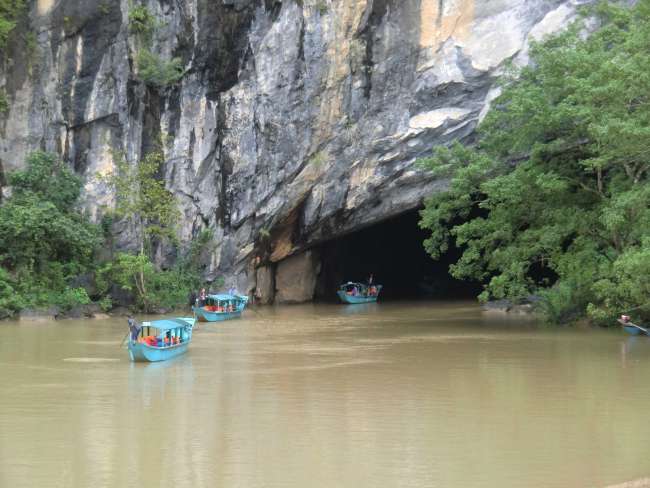
רייזע ריפּאָרץ וויעטנאַם


